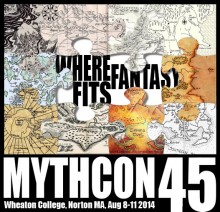Welcoming Mythcon
Fans and scholars of J.R.R. Tolkien, C.S. Lewis and other fantasy literature will descend on the Wheaton campus this weekend (Aug. 8-11) for the 45th annual Mythcon.
First held in 1970 at Harvey Mudd College in Claremont, Calif., Mythcon began as a conference based entirely on Tolkien’s works but has since expanded to include a range of fantasy and mythic literature topics. It is organized annually by the nonprofit Mythopoeic Society, and this year it is being hosted by society member Michael Drout, Wheaton professor of English and director of the college’s Center for the Study of the Medieval.
A Tolkien scholar, Drout was invited to be a guest speaker at Mythcon 42, held in 2011 in Albuquerque, N.M. While at the conference, he raised the idea of bringing the conference to Wheaton and agreed to be a host. He is being assisted by students Jillian Valerio ’17 and Stephanie Lowell ’17.
“We hadn’t had Mythcon in New England in a long time, and I thought the campus would be perfect for it,” Drout said. “It also fits because we have a regular class on J.R.R. Tolkien, we have students who have studied and are interested in him, and we have students who have done a lot of medieval work.”
The four-day event will feature academic paper presentations and discussions, a banquet, a collaborative reading of “Beowulf,” an evening Bardic Circle where participants can share readings and music, an auction and dealer’s room with books, jewelry and other items for sale, and presentation of the annual Mythopoeic Awards. There also will be a few Mythcon traditions, such as a masquerade where people show up in fantasy costume, and a late-night game of Golfimbul on the Dimple.
“At the beginning of ‘The Hobbit,’ Tolkien makes this sort of elaborate joke that once there was a Hobbit, Bullroarer Took, that was so tall, he was like 5 feet tall, and he could ride a horse. When goblins invaded the Shire it was said that he knocked [Golfimbul] the goblin king’s head clean off with a club and it flew a hundred yards and fell down a rabbit hole, and thus the battle was won and the game of golf invented at the same time,” Drout explained. “So we have a goblin head, which I think was taken off a doll, and a bat, and you play this game where you hit the goblin head once for accuracy.”
Though Mythcon has its strange traditions, the conference is the oldest and most prestigious of its kind, and the Mythopoeic Awards are highly coveted, Drout said. One hallmark of the event is the opportunity for serious, in-depth discussions.
“It goes back to Mythcon’s sort of hippy, countercultural roots, where it’s not just about you as a professor presenting. The ideas of the other people in the room are just as important, and that’s what’s really valuable about the conference,” Drout said. “When you give a paper at Mythcon, you get great feedback from people who really know the material.”
Of the approximately 150 people expected at this year’s conference, Drout estimated about half were academics—graduate students and faculty—while the other half were fans and enthusiasts of fantasy and mythic literature. Participants come from more than 30 U.S. states and several different countries.
“It’s the only conference I know where you can turn the corner and have someone in full costume and elf ears having a conversation with the leading professors in the field, and there’s no, ‘oh you’re just a fan,’” Drout said. “The people involved in Mythcon really know their stuff.”
Each conference has a distinct theme. This year’s is “Where Fantasy Fits,” which highlights the place of fantasy in modern culture. As explained in the Mythcon 45 program: “Fantasy literature does not fit comfortably into any scheme. Both old and new, traditional and innovative, popular and elite, mainstream and esoteric, escapist and engaged, high-tech and anti-technology, fantasy defies definitions and transcends categories, dramatizing the incompleteness of our understanding of our own imaginations.”
The conference annually highlights two guests of honor—scholar Richard C. West and author/artist Ursula Vernon. West is founder of the University of Wisconsin Tolkien Society and editor of its literary journal Orcrist and as a Tolkien scholar has published numerous articles on the subject. Vernon, who won the Hugo Award with her graphic novel “Digger,” is also the author/illustrator of the children’s series “Dragonbreath,” among other titles.
Wheaton students can attend Mythcon 45 at no cost, and Drout said he encouraged those enrolled in his fall Tolkien course to drop by some of the sessions. He will be presenting on Friday, a paper on Tolkien’s “Beowulf” translation.
“When they founded Mythcon, it was sort of this outsider thing, and as Tolkien studies gained academic respectability, it has changed from just enthusiasts to enthusiasts plus professors who study it, plus people who are interested in C.S. Lewis and general fantasy literature,” Drout said. “Now with the whole ‘nerd chic’ thing, and increasing interest in Tolkien and Dungeons and Dragons and fantasy, it’s become way more mainstream than it used to be. It’s neat to see how that’s evolved.”

